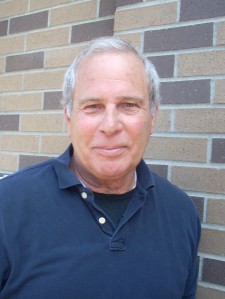 Actor/director Peter Alzado plays Joe Keller in Arthur Miller’s “All My Sons” now playing at the Camelot Theatre in Talent. A veteran actor of Broadway, television and film, Alzado spent five years as artistic director of the Actors’ Theatre (now the Camelot Theatre) before founding Oregon Stage Works, where he served as artistic director for 10 years. We met at Pony Espresso one sunny afternoon.
Actor/director Peter Alzado plays Joe Keller in Arthur Miller’s “All My Sons” now playing at the Camelot Theatre in Talent. A veteran actor of Broadway, television and film, Alzado spent five years as artistic director of the Actors’ Theatre (now the Camelot Theatre) before founding Oregon Stage Works, where he served as artistic director for 10 years. We met at Pony Espresso one sunny afternoon.
EH: Why is “All My Sons” pertinent today?
PA: It’s about responsibility to the greater good. Just being responsible to yourself and to your family doesn’t cut it. Individually, we have a responsibility to the world. If we disregard that responsibility, then it wreaks havoc. You’re creating a world of divisiveness, hatred and anger. And it’s a world that doesn’t have basic equality to it. Eventually it wreaks havoc on the people you’re trying most to protect, which is your family and people you love.
EH: How do you develop a play?
PA: To my mind, it’s all about words and action. There are themes: One has to be aware of what those themes are, and how to interpret those themes, so that they are accessible to everybody. What often happens now is, directors are layering things on top of the script that have absolutely nothing to do with the script whatsoever. It’s just coming out of what they think could be creative, but it doesn’t take into consideration the writing. People recognize subliminally (and sometimes consciously) that they are not being told the truth. That “truth” is found in the writing, and if you start layering things on top of the text, people stand up, applaud, say that it’s great, and it meant nothing. It’s an intellectual pretense. That’s not the effect that you want to have in the theater or in any of the arts. Continue reading ‘If you can touch people’s souls … then you’re doing something’
 Asia Mark plays the Apprentice Poet in “UniSon,” Oregon Shakespeare Festival’s tribute to the poetry of August Wilson devised by UNIVERSES. While at Western Michigan University, Mark attended Lecoq acting training with the Arts University Bournemouth, England. She also auditioned for UNIVERSES and has been touring with them for the past two years. We met in the Hay-Patton Rehearsal Center on the OSF Campus.
Asia Mark plays the Apprentice Poet in “UniSon,” Oregon Shakespeare Festival’s tribute to the poetry of August Wilson devised by UNIVERSES. While at Western Michigan University, Mark attended Lecoq acting training with the Arts University Bournemouth, England. She also auditioned for UNIVERSES and has been touring with them for the past two years. We met in the Hay-Patton Rehearsal Center on the OSF Campus.